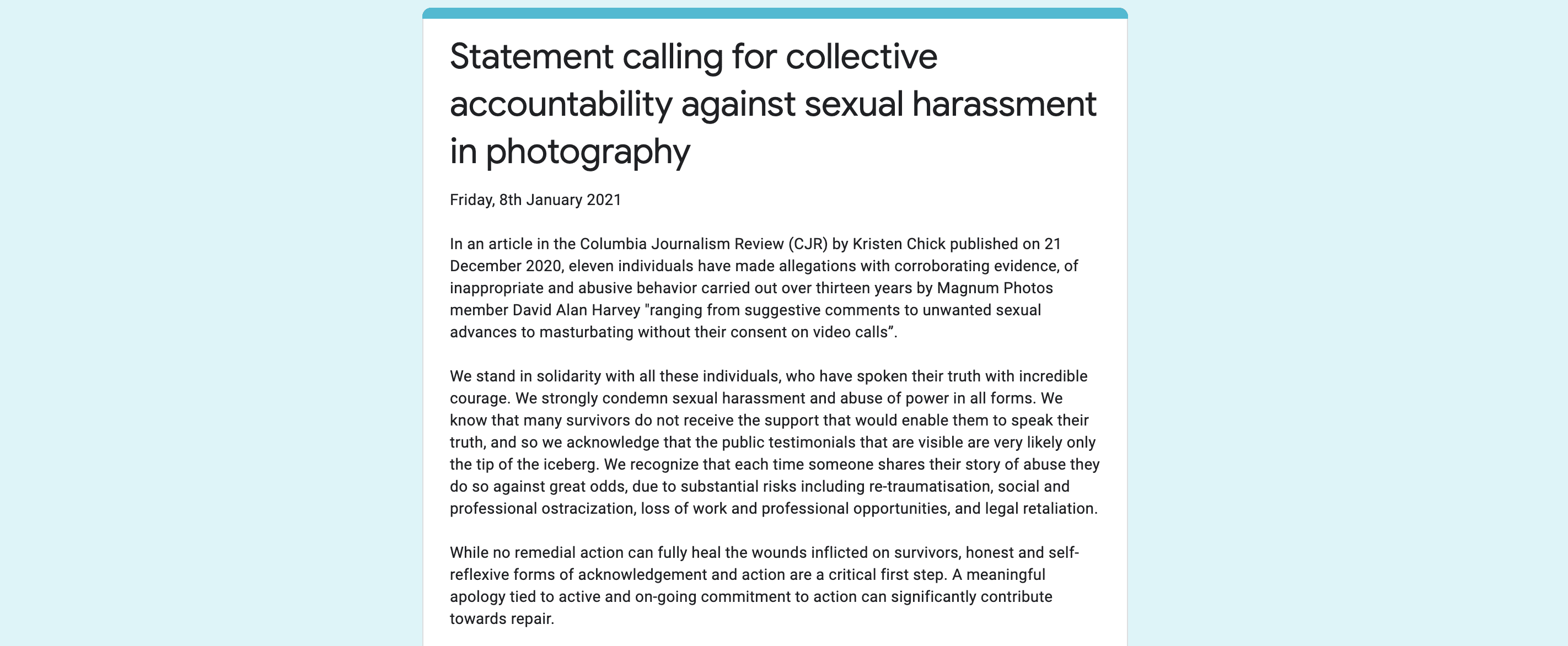The letter, which began circulating for signatures on 08 January, is supported by over 600 global figures in the industry, including seven Magnum photographers
A statement signed by 647 photography professionals from around the world demands that Magnum Photos take the lead in demonstrating immediate action against sexual harassment in the photography industry. Published in full here, it calls on the historic photo agency to “demonstrate moral courage and leadership… by taking proactive and reparative steps towards setting new institutional precedents and standards”.
The letter, which began circulating for signatures on 08 January, follows a series of allegations of inappropriate conduct by Magnum photographer David Alan Harvey, first exposed in August 2020, by Andy Day on Fstoppers. Day’s article revealed that Magnum Photos was hosting images, taken by Harvey, of alleged child exploitation. Ten days later, the photo agency announced a major review of their archive. Then, in October 2020, prompted by a separate allegation of sexual harassment made by a female colleague, Magnum announced the suspension of Harvey, along with an internal investigation.
A slew of further allegations were made public on 21 December, when 11 women described inappropriate behavior from Harvey, in an article written by Kristen Chick for Columbia Journalism Review. In a joint statement on behalf of Magnum, published on 05 January, Olivia Arthur (President) and Caitlin Hughes (CEO) announced further investigations into the allegations, as well as a promise to publish Magnum’s code of conduct, which was shared on 14 January.
In a collective comment to British Journal of Photography over email, the team behind the statement, who do not wish to be individually named, voiced their frustration over the lack of urgency in response from Magnum: “This feels frustrating and symptomatic of institutional responses. Those of us who work within or with institutions know that things usually move slow due to internal bureaucratic and legal processes. We also know that things can move faster if decision-makers come together with urgency… Until institutions, especially those such as Magnum that have the access to these resources, make this high priority in their agendas… it is unlikely that new outcomes will present themselves. In a culture that is steeped in patriarchy, and a legal system that has historically been positioned against womxn in cases like these, there is an urgent need to build a support system that enables survivors to even think of coming forward to institutions, and risking making themselves more vulnerable.”
Among the letter’s signatories are seven Magnum photographers: Bieke Depoorter, Carolyn Drake, Cristina De Middel, Hannah Price, Nanna Heitmann, Newsha Tavakolian, and Sohrab Hura. The organisers of the statement have been in touch with other members of Magnum, through which they have shared “additional and more detailed recommendations, in addition to what we have addressed in the statement”.
The organisers said that despite past actions and inactions, this is an opportunity for Magnum to move forward. “Given that a lot of the work by many Magnum members is in the realm of social justice, we would like to assume that their experience and understanding of social issues can guide them towards what would be the ideals of justice that they aspire for… Otherwise, they will become a redundant institution, living behind smokescreens and a slick brand but actually hollow inside, with very little integrity.”
In response to the letter, Olivia Arthur, who became the first female president of Magnum Photos in June 2020, said: “What this statement highlights for me is the need for us – and me personally – to reach out to the broader community and listen to how they are feeling and what they are calling for… I believe we can build bridges, and that many of the things we stand for, and that we want to see in the future, are the same.” Referring to Magnum’s ongoing review of its archive, its process for logging complaints, and the publishing of its code of conduct, Arthur said a lot of work is already underway, but equally, she recognises that the organisation has a long way to go. “Ultimately we need to create an environment and culture that is fair, welcoming and doesn’t tolerate abuse of any kind. Everything that we are doing at the moment is working towards that and I do believe we will get there, but I also know that there is a lot of work to be done.”
For the organisers, this statement came into existence for two reasons: to centre and support survivors, and to initiate an intersectional framework in moving forwards. “First and foremost, we hope that survivors associated with this case, and others, feel that they are not alone in this fight,” they said.
The statement also emphasises collective accountability, calling on not only Magnum, but other institutions and gate-keepers to actively participate in setting new institutional precedents. “There is an urgent need for us all to examine our own roles in which we may have been complicit in these systems,” they said. “We hope that the statement can and will be a tool to start conversations that turn into active work in our own communities… In addition to calling on institutions like Magnum, we need to start where we can, in our own institutions – big or small – and in our own communities.”
The statement can be read in full here.

